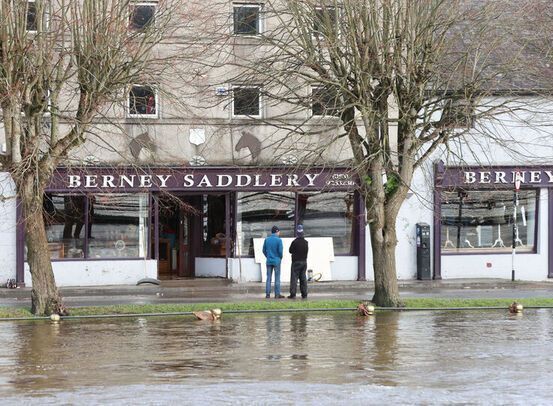"More than 1,000 journalists descend on Des Moines to cover the Iowa Caucuses."
The headline from Editor & Publisher magazine tells us something; actually more than one thing. Firstly, journalists are not quite gone the way that the Buffalo almost once did. They can still congregate in numbers.
Columnist Maureen Dowd in the New York Times, herself afoot in Iowa, referred to "hordes of reporters."
But the E&P headline, and Dowd's observation, also point to something else. With the Iowa caucuses fading in the falling snow, these journalistic hordes will disperse. Most will return to major media hubs and organize themselves for the next caucus mass gathering.
Iowa will be left to its own journalistic devices. The folks in the likes of Des Moines will be well enough served by locally based journalists, but out in the rural parts of the state, where frost, ice and snow blankets the corn stubble, a journalist will be about as common a sight as a swallow in January.
That's because the coverage of local news in many parts of America is dying. Which is not to say that the news itself is dying. There's more than ever of it. It's simply not being covered, investigated, and sifted through by way of sane and sensible analysis and expressed opinion.
By way of illustration, here's part of a recent opinion piece in the Washington Post penned by Erik Wemple.
"Chris Kelly writes a twice-weekly column for the Scranton Times-Tribune, his place of work for the past 27 years. For all but a few months of that tenure, his bosses have been the Lynett family, descendants of E.J. Lynett, a breaker boy in the coal mines of northeastern Pennsylvania who went on to buy the newspaper in 1895. Over four generations, the Lynetts reminded staffers and their community alike of their commitment to both local journalism and local ownership.
"When Kelly and some colleagues attended a journalism awards event in Harrisburg, he heard the gripes of staffers from the Reading Eagle, which had been acquired by MediaNews Group (MNG), a cost-cutting newspaper chain owned by hedge fund Alden Global Capital. “We all said to each other, ‘Thank god the Lynetts own us, because they’d never sell us to a hedge fund,’” recalls Kelly. This past summer, the Lynetts did precisely that. On Aug. 31, staffers at the Times-Tribune gathered for a Q&A with James Lewandowski, CEO of Times-Shamrock Communications, the Lynett family’s media company.
"Those staffers had just learned that the company had new owners: Alden/MNG had bought the Scranton Times-Tribune along with three other regional dailies — the Citizens’ Voice (Wilkes-Barre), the Standard-Speaker (Hazleton) and the Republican Herald (Pottsville) — and other assets. Times-Shamrock held on to its radio and outdoor advertising businesses.
"No one from Alden, however, was in attendance to answer questions. When he fielded inquiries about the paper’s future, Lewandowski said, “You’ll have to ask them.” Kelly responded, “Who is them?” Still seething at the turn of events, the columnist recounts: “I said, ‘You know, when we heard about the sale being possible, I said please don’t let it be a hedge fund. And you didn’t just sell it to a hedge fund, you sold it to the worst one.’”
"That’s a fair summation of Alden’s reputation. The company owns the second-largest chain of newspapers in the country, with 68 dailies and more than 100 weeklies, a brand assortment that includes the San Jose Mercury News, the Chicago Tribune and the Orlando Sentinel. En route to that portfolio, Alden has slashed payrolls, consolidated journalistic beats, closed offices and otherwise squeezed its properties in a scratch-and-claw pursuit of cash flow. “I never read a good word about their management philosophy,” says 80-year-old Scranton publisher emeritus George V. Lynett."
That's Scranton. But pick any small city in America, any medium sized or small town. Any place that thinks of itself as a community.
And it's not just the smaller places. The demise of locally covered local news is evident even in big cities such as New York where the streetscape is now dotted with gleaming metal "NewsStands" that all too often carry no news at all.
Some larger media newspapers are trying to fill the void. The Boston Globe recently announced that it would be extending its coverage of goings-on in New Hampshire. The Minneapolis Star Tribune announced that it would be reaching beyond its urban fortress and into the great expanse of Minnesota.
But when it comes to covering local news, you simply can't beat the local news coverers.
Yes, there are still plenty of journalists. When George Santos beat a retreat from Congress recently he was chased to his car by a large posse of reporters, photographers and videographers. The Santos exit from Capitol Hill could have been pool-covered by one reporter, photographer and videographer. The rest of the posse could have been better employed working the vastness of America. But that's not how it works.
The Washington Post motto atop its front page is "Democracy Dies In Darkness." Well, not literally, though if by darkness you mean the absence of free and objective journalism. And for any reason. It could be a totalitarian dictatorship, hostile political forces, or the ravages of a vulture fund. It could be a population hooked on great dollops of rubbish on the TV or internet. So, yes, "Darkness."
And this darkness comes in different forms. It can be found in a newsless "NewsStand," a once bustling newsroom ravaged by a vulture fund, or on a frosty field of corn stubble with not a shoe leather reporter in sight.








